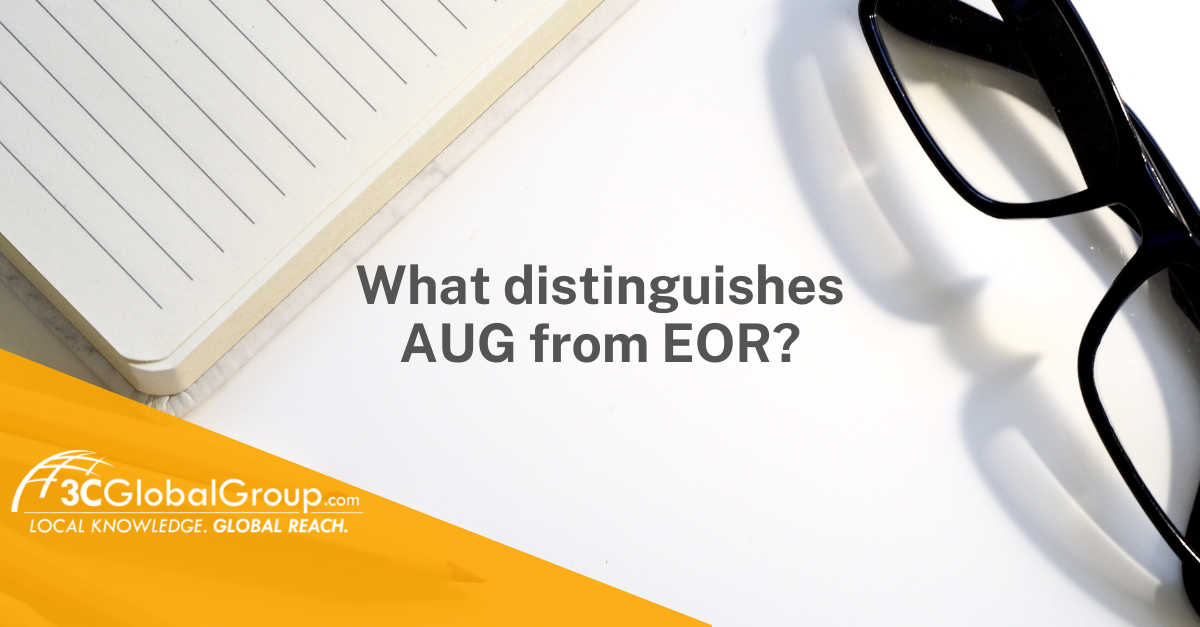
Hiring international contractors can be an excellent way for an organisation to expand their team across different countries and find talented and knowledgeable candidates worldwide. However, there are many regulations that organisations and their contractors must follow to stay compliant with international employment and tax laws when hiring contractors in Germany.
Throughout this piece, we look at two solutions often explored by organisations looking to hire contractors in Germany. These are the German Arbeitnehmerüberlassung (or AUG Licence) and Employer of Record solutions.
What is an Employer of Record (EOR)?
An EOR (Employer of Record) is an external entity that serves as an employer for a worker while working for a different company. EORs can simplify the global recruitment process for companies and negate the need to set up entities in multiple foreign countries.
An EOR performs various administrative functions and compliance responsibilities such as onboarding, payroll processing, visa and work permit processing, tax and social security contribution payments, and maintaining employment contracts and compliance with labour laws. By taking on the legal responsibilities of employment, EORs ensure that companies' hiring practices are fully compliant and that their employees receive the necessary benefits.
Employer of Record organisations allows international organisations to hire talent in Germany through an EOR organisation with a German entity. This solution is excellent for international companies not based in Germany and wish to employ German talent in a manner that complies with all relevant laws.
An organisation that provides EOR services will be versed in the relevant employment and taxation laws of the region in question and will take responsibility for the necessary paperwork. Hiring an EOR can make international hiring and contracting more seamless for the employer and the candidate. Contact us today if you wish to hire in Germany through an EOR.
Benefits of utilising an EOR:
In a recent blog post, we explored the benefits of utilising an Employer of Record as a self-employed contractor; you can read more here.
What is an AUG licence?
An employed model, the AUG licence is the name given to the German labour leasing licence. Although labour leasing licences are practised across many European countries, this article focuses on the German AUG licence.
The full name for AUG is Arbeitnehmerüberlassung. This form of employment is popular in Germany for businesses seeking to fill temporary or short-term positions. This licence type is ideal for German organisations that may need to hire a contractor who can lend their expertise to work on a single project basis. An AUG licence may be best for organisations working in Germany who wish to employ skilled local contractors for short-term projects and negate the need to fulfil a full-time role. However, one must note that an AUG licence is limited to a term of 18 months in Germany, depending on the organisation. One must also note that companies hiring an employed contractor from a provider without an AÜG licence may find themselves in conflict with German Law.
Benefits of an AUG Licence:
One of the primary benefits of an AUG licence is that it allows a German organisation to hire German specialists on a short-term basis whilst negating the need for a direct contract of employment and the need to hire an employee on a full-time basis.
The licence gives legal protection for contractors hired on a short-term basis.
Utilising a labour leasing licence like the German AUG licence eliminates the likelihood of chain law and is a compliant solution. This means that the organisation that hires a contractor can establish a direct contract with their contractors, ensuring only two entities are involved in the process. This streamlined process makes it easier to address any issues that may arise during the service agreement's duration. Here at 3C Global, we provide AUG solutions; contact us today to learn more.

Key differences between an AUG licence and an EOR:
- An AUG licence primarily concerns individuals who work as contractors rather than freelancers as it works within an employed model of labour leasing, whereas freelancers often own their own entities. However, if an organisation or recruitment agency finds a suitable candidate whom they wish to employ on the basis that they are neither on their payroll nor hired on a freelance basis, a leasing model may be an ideal solution. Under this labour leasing AUG model, another company hires the candidate (e.g. 3C Global) and leases them out to the organisation. This solution can be ideal for organisations looking for a compliant solution for hiring talent on a short-term basis. For freelancers working under the Freiberufler model (freelance/self-employed), a contingent workforce management company such as 3C Global would engage with candidates on a Statement of Work (SOW) contract for a specific project.
- An AUG is a leasing agreement specific to Germany that mainly concerns German companies who wish to employ local talent on a short-term basis for up to 18 months.
- An EOR allows international organisations that don't currently have a German entity to hire German talent through an EOR organisation with a local entity. Talent can often be hired for a term longer than 18 months under this solution.
Important to note:
In some cases, if the contractor is remote, an AUG licence may not be required. However, it is vital to consider the requirements to comply with German law. Generally, an AUG licence is required when a contractor is employed short term through an employer of record solution when both parties are based in Germany (the organisation leasing the contractor and the contractor themselves).
For more information regarding employing contractors in Germany, check out our recent article here.
In Conclusion:
When considering hiring contractors internationally in Germany, organisations have two primary solutions: the German Arbeitnehmerüberlassung (AUG Licence) or Employer of Record (EOR) solutions. While both offer unique benefits and advantages, it's crucial to choose the right solution based on your specific business needs, the duration of the project, and the region where the contractor will be based. Understanding the critical differences between AUG licences and EORs allows you to make a more informed decision and ensure your organisation complies with international employment and tax laws. If you need further guidance or wish to learn more, please do not hesitate to contact our knowledgeable team today!


